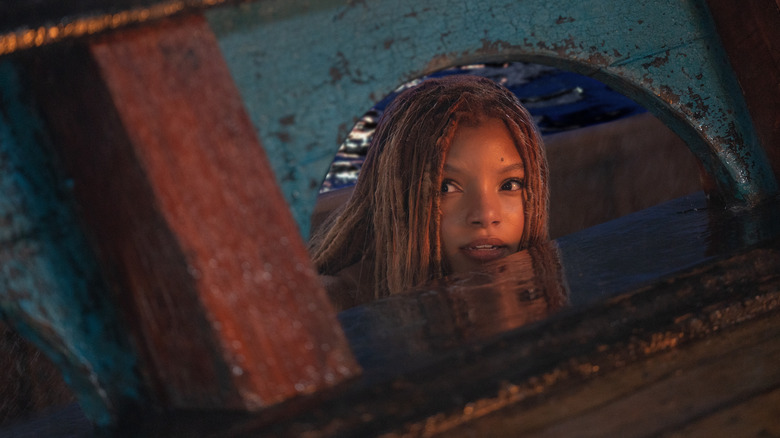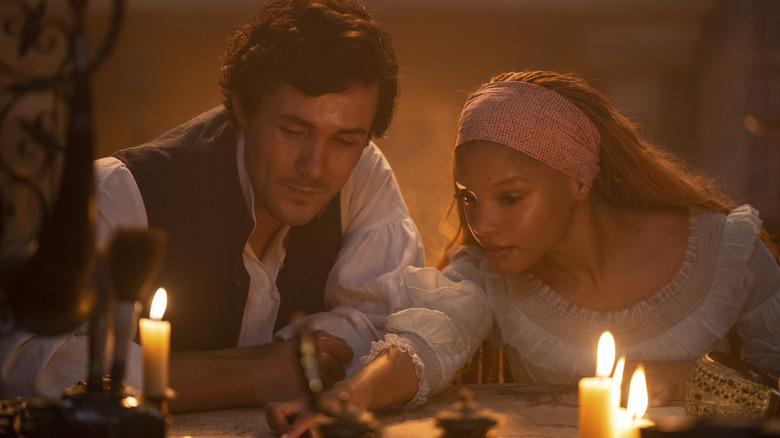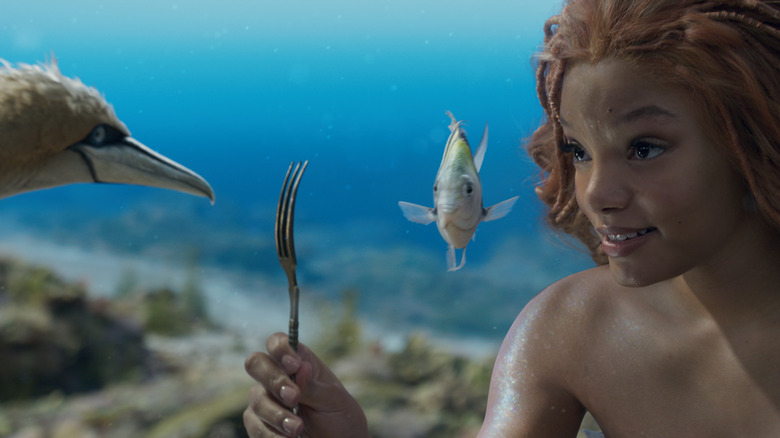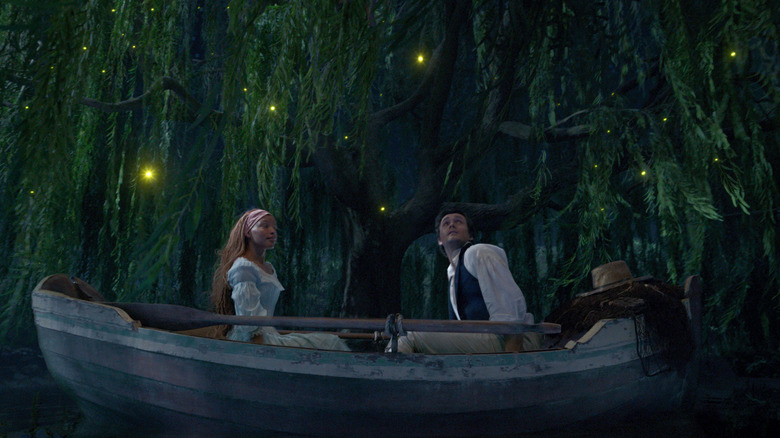
The following post contains spoilers for "The Little Mermaid."
Disney's live-action version of "The Little Mermaid" will premiere just in time for Memorial Day weekend. You know the story: Halle Bailey plays Ariel, the young mermaid with a powerful desire for adventure who runs afoul of the sea witch Ursula (Melissa McCarthy) and falls in love with Prince Eric (Jonah Hauer-King). Joining her on her adventures on land are her little fish buddy Flounder (voice of Jacob Tremblay) and bird friend Scuttle (voice of Awkwafina).
I recently spoke to director/producer Rob Marshall and producer John DeLuca about how they filmed the singing sequences, Javier Bardem's song that was cut from the film, whether or not there is a mid- or post-credits scene, and if there was ever a discussion about Ariel not getting married.
Note: This interview has been lightly edited for clarity and brevity.
'So It Wasn't Just Falling In Love With A Handsome Guy Or The Pretty Girl'

Halle has a gorgeous voice, and Disney takes voices very seriously. Even in "Frozen," they were animating the correct breaths, which, as a former singer, that's a big thing. I'm curious how the rigging affected that for you, with all the actors live on the set. I know, obviously, you recorded before.
Marshall: Yes. Well, actually, we also did a lot of recording live as well. The goal for me always is that when you're watching the film, it all feels live, even if it's not. I don't think people know this fully -- you would know this as a singer -- but when you are doing film, even when you are singing with a track, you are still singing. You are actually fully singing. You have to; otherwise, it doesn't look like anything. Doesn't look real at all. It was challenging. Luckily, everybody we worked with, Halle and Javier and Melissa, they're so strong, so physical, that actually they could do what they needed to do: breathe and sing in those crazy rigs.
Was there ever any discussion of not having them get married at the end since they're teens? Well, she's a teen.
Marshall: Well, we thought about it, but we thought it was really important that the union that they create is something that actually begins the healing process of between these two worlds.
DeLuca: And we really wanted the relationship to be what won out and having them really experiencing each other as friends -- deep, deep friendship. So it wasn't just falling in love with a handsome guy or the pretty girl. The wedding, we didn't show the wedding. We don't really have a wedding because we didn't want to make it that it was all the penultimate thing is the wedding. No, it's the relationship. They're going off together and adventuring together.
Marshall: Yeah. It was great to find that. It was, you're absolutely right, more important than the ceremony is the actual, let's go and seek unchartered waters.
DeLuca: And just start to make a crack at bringing worlds together. It's just the beginning, as we say in the film. Never going to change, but totally, but hopefully, they'll open people's eyes.
Totally. I did sit through all the credits, and I'm curious, was there ever a thought of a mid- or post-credit scene?
Marshall: We decided not to do that. We thought the story had been told. Sometimes that feels a little gimmicky to me, and we didn't need to play anything like that. I also have to say that our score was so stunning that we get to hear it with these ... and we had such a massive -- this is the truth -- so many people involved. You see, this is a four-and-a-half-year process to create this movie. So the fact that we thought, well, those credits are plenty long. Yeah. So we never actually, no.
DeLuca: Yeah, we felt that the story had ended in the proper way.
'One Of The Things That We Did Also Was We Don't Sing In The Film Until 15 Minutes In'

In the press conference, you guys mentioned that Javier had a song that got cut for time. But I'm so curious about what kind of song you gave him and how he did as a singer.
Marshall: Well, he's a spectacular singer, and he does it with such passion. It was a very powerful song about Ariel herself and the frustration. But what was interesting, it wasn't really for time that we cut it. It was mostly because it robbed from the ending. When you're creating new material, you don't know. The film tells you as you work on it. We had so many new pieces, so many new songs and sequences that we were bringing to this to make it a fully live-action piece. And it just felt like it was...
DeLuca: We cut out some of the air from his character and the conflict that he and Eric had.
Marshall: Yes. You have to keep that friction to the very moment when he actually embraces her and hears her, maybe for the first time. So that's what really what led it. It was story.
In the press conference also, there was a whole discussion about musicals and how they can go off the rails and quickly become "Saturday Night Live" sketches. As a musical theater person, I have seen this happen. Which number or numbers were ones that you had to really watch out for that happening?
Marshall: Well, it was the new material, particularly. I felt like we had to make sure that those songs are earned and feel seamless. One of the things that we did also was we don't sing in the film until 15 minutes in, and we moved "Fathoms Below" from the opening, which felt a little very musical theater-y to a place that felt much more organic, that they're singing a sea shanty.
DeLuca: Drunken shanty and celebrating Eric's 21st birthday.
Marshall: Exactly. It felt much more organic. But that's the goal, especially with the live-action piece, it feels so much more realistic. You have to earn the songs. They have to feel seamless coming from story. It can't feel applied. It can't feel like, "Oh, let's just put one in." And that was the goal. And like I said, especially with the new material, but even something like Scuttlebutt, that song ... it's so fun, but it replaced a scene.
DeLuca: She gets all the information out --
Marshall: -- in that song. It only happens in a song.
'It's Very Different In A 2D World Than It Is In A Live-Action World'

Something interesting about the songs here is that, more so than the animated film, there's an urgency to them. There's that sort of aggressive -- it's really cool. I'm curious about the direction there.
Marshall: [It was] very important for us to raise the stakes for these songs because these are real people singing them. It's very different in a 2D world than it is in a live-action world.
DeLuca: To me, though, a story needs to have life-or-death stakes and must mean all of those things. Even just with "Part of Your World," that's the motor of the entire film. We have to believe that she wants that more than anything in the world. And that's why we chose not to have her actually ever break the surface till the end of that song. She can't stand it anymore. And she finally, for the first time, disobeys and goes and breaks the surface and sees the real world for the first time. That was very important to us. That's why Scuttle is a diving bird [in the live-action film]. She gets all her information from Scuttle below the surface.
Marshall: That urgency, not only in the songs but in the characters we wanted to give it too, because we were doing the live-action. We created the relationship between Triton and Ursula. We made them brother and sister, and she being the sad black sheep of the family that will do anything to get back at this God, the older brother. Eric, we gave him a kindred spirit to Ariel's desires and needs and pain. We gave him that same adventurous spirit with a backstory that paralleled hers, in a sense. So the characters as well as the songs.
DeLuca: That's what you do with a live-action film. You flesh out the story. You give it more reason. You give it more urgency and more stakes to make it really something you lean into. I want people to be engaged and really care about these characters.
"The Little Mermaid" will hit theaters on May 26, 2023.
Read this next: The 12 Most Influential Disney Movies Of All Time
The post The Little Mermaid Director and Producer Talk New Music and Earning The Songs [Exclusive Interview] appeared first on /Film.

